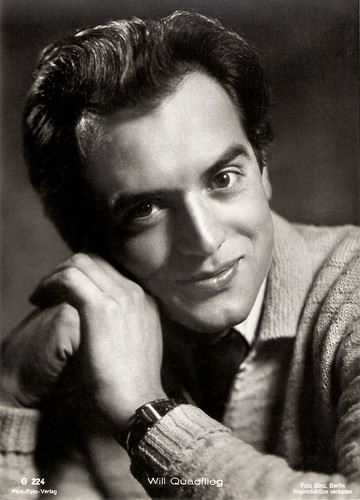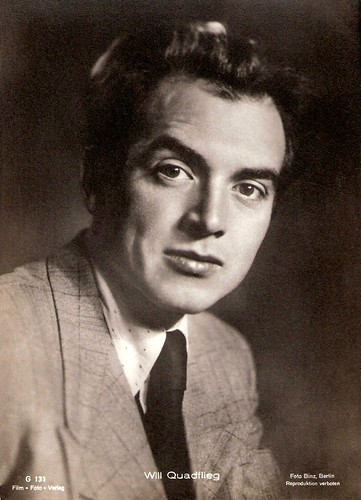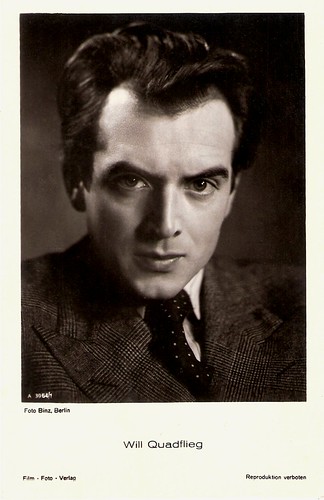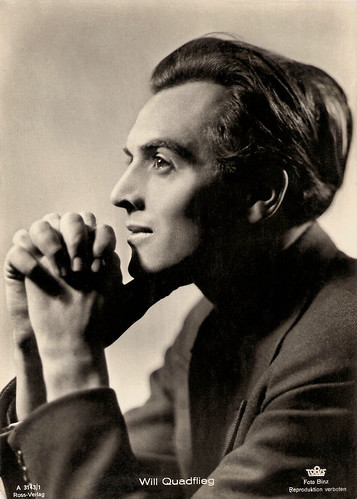Will Quadflieg (1914-2003) was one of Germany's best post-war actors, who had a career that lasted more than 60 years.

German postcard by Film-Foto-Verlag, no. A 3661/2, 1941-1944. Photo: Foto Binz, Berlin.

German postcard by Film-Foto-Verlag, no. A 3525/2, 1941-1944. Photo: Foto Binz, Berlin.

German postcard by Film-Foto-Verlag, no. A 3661/1, 1941-1944. Photo: Baumann / Ufa.
Propagandafilms
Friedrich Wilhelm "Will" Quadflieg was born in 1914 in Oberhausen, Germany. He attended actor's training when he was still at secondary school and became a trainee at Stadttheater Oberhausen after finishing his final school exams started his career as a trainee at the Theater Oberhausen. In 1933 he made his stage debut there in the operetta Friederike by Franz Lehar. Although he was not accepted at Cologne"s drama school, engagements in Gießen, Gera, Düsseldorf and Heidelberg followed. In 1936 he went to Berlin, where he worked at the Volksbühne under Eugen Klöpfer from 1937 to 1940, and from 1940 to 1944 at the Schiller-Theater under a.o. Heinrich George. During his long stage career he would portray classic characters like Romeo, Hamlet, Othello, Macbeth, Faust, Mephisto, Tasso, Don Carlos and Nathan, and meanwhile he progressed into an excellent and respected stage actor with an intensive performance. During the 1930's and 1940's, he also appeared in a number of popular films including two propagandafilms. He made his film debut with Der Maulkorb/The Muzzle (1938, Erich Engel), a comedy version of Oedipus starring Ralph Arthur Roberts. The handsome young actor became well-known as a jeune premier opposite Marika Rökk in the musical Kora Terry (1940, Georg Jacoby), and in the Zarah Leander vehicle Das Herz der Königin/The Heart of A Queen (1940, Carl Froelich). He also appeared in the anti-British propaganda film Mein Leben für Irland/My Life for Ireland (1941, Max W. Kimmich), and another propaganda film G.P.U./The Red Terror (1942, Karl Ritter) with Italian actress Laura Solari. About his role during World War II he later confessed that he was a hanger-on and that he was glad to be allowed to play on stage instead to fight at the front. Very popular became his romantic roles as a musician in Die Zaubergeige/The Magic Fiddle (1944, Herbert Maisch) with Gisela Uhlen, and Solistin Anna Alt/Soloist Anna Alt (1945, Werner Klingler) starring Anneliese Uhlig.

German postcard by Film-Foto-Verlag, no. G 224, 1941-1944. Photo: Foto Binz, Berlin.

German postcard by Film-Foto-Verlag, no. G 131. Photo: Tita Binz, Berlin.
Faust
After the end of the Second World War, Will Quadflieg at first performed at several theatres before he became a co-founder of Junges Theater, today Ernst-Deutsch-Theater, in Hamburg in 1946. From 1952 to 1959, he played the title role in Hugo von Hofmannsthal's play Jedermann/Everyman at the Salzburger Festspielen. From 1956 till 1962 he worked under the direction of Gustaf Gründgens at the Deutschen Schauspielhaus in Hamburg. He played composer Franz Liszt in the film Lola Montès (1956, Max Ophüls) featuring Martine Carol. One of his most widely recognized film parts was the title role in the film adaptation of Faust I by Johann Wolfgang Goethe, Faust (1960, Peter Gorki). The film was little more than a photographed stage play, lensed during a performance of Faust I, staged in 1957 at the Deutsches Schauspielhaus. Gustaf Gründgens played Faust's antagonist Mephisto, and both actors are still best-known for their respective roles. Among his few other films are the crime melodrama Schwarze Augen/Dark Eyes (1951, Géza von Bolváry) with Cornell Borchers, and the musical Die Försterchristl/The Forester's Daughter (1952, Arthur Maria Rabenalt) with Johanna Matz. In 1964 he appeared at the famous Burgtheater in Vienna in the title role of William Shakespeare's Macbeth. This was another highlight of his career. His stage performances stayed on the highest level, but at the end of the 1960's, he did not connect with the new generation of politically motivated theatre makers. It became quiet around the more traditional Quadflieg.

German postcard by Film-Foto-Verlag, no. A 3964/1, 1941-1944. Photo: Foto Binz, Berlin.

German postcard by Ross Verlag, no. A 3143/1, 1941-1944. Photo: Foto Binz / Tobis.
Dantons Tod
Will Quadflieg returned to the stage in the mid-1970’s in productions of director Rudolf Noelte. Quadflieg felt a strong personnal and artistical connection to the director and they often worked together on stage. Noelte also directed him in a film version of Georg Büchner’s Dantons Tod/Danton's Death (1981, Rudolf Noelte), starring Götz George. Quadflieg often appeared on television, like in Dieter Wedel’s mini-series Der große Bellheim/The Great Bellheim (1993) and in popular Krimi series like Der Kommissar and Derrick (1979-1994). Later he also performed as a lecturer, and he appeared in films like Die Reise/The Journey (1986, Markus Imhoof) and the TV-film Der gute Merbach/The Good Merbach (1994, Matti Geschonneck) with Günter Lamprecht. Filmportal.de weites about Die Reise: "a film about the 1968 student revolt and the RAF terrorist group based on the autobiography of Bernward Vesper, Quadflieg portrayed the protagonist's father. The part was modelled on the Nazi poet Will Vesper – and used by Quadflieg to come to terms with his feelings of guilt for his conformist behaviour during the Nazi regime." For his work, Quadflieg was awarded many times, e.g. with the Großes Bundesverdienstkreuz (Germany's Grand Federal Cross of Merit) in 1976. Privately, he was active for the peace and the ecological movement and was involved with the political party die Grünen (the Greens). From 1983 on, he worked again at the Thalia Theater in Hamburg, where he stayed till his death. In 2003, Will Quadflieg died in Osterholz-Scharmbeck, Germany from pulmonary embolism. He was 89. He was married twice: first to the Swedish Benita von Vegesack and since 1963 to the actress Margarete Jacobs. Among his five children are best known actor Christian Quadflieg and author/publisher Roswitha Quadflieg.

German postcard by Film-Foto-Verlag, no. A 3535/1, 1941-1944. Photo: Foto Binz, Berlin.

German postcard by F.J. Rüdel Filmpostkartenverlag, no. 101. Photo: Pontus-Film / National / Lantin.

German postcard by Kolibri-Verlag G.m.b.H., Minden/Westf., no. 1886. Photo: Rotary / Schorcht / Schlawe. Publicity still for San Salvatore (1956, Werner Jacobs).
Sources: Thomas Staedeli (Cyranos), Stephanie D'heil (Steffi-Line) (German), Filmportal.de, Wikipedia (English and German), and IMDb.

German postcard by Film-Foto-Verlag, no. A 3661/2, 1941-1944. Photo: Foto Binz, Berlin.

German postcard by Film-Foto-Verlag, no. A 3525/2, 1941-1944. Photo: Foto Binz, Berlin.

German postcard by Film-Foto-Verlag, no. A 3661/1, 1941-1944. Photo: Baumann / Ufa.
Propagandafilms
Friedrich Wilhelm "Will" Quadflieg was born in 1914 in Oberhausen, Germany. He attended actor's training when he was still at secondary school and became a trainee at Stadttheater Oberhausen after finishing his final school exams started his career as a trainee at the Theater Oberhausen. In 1933 he made his stage debut there in the operetta Friederike by Franz Lehar. Although he was not accepted at Cologne"s drama school, engagements in Gießen, Gera, Düsseldorf and Heidelberg followed. In 1936 he went to Berlin, where he worked at the Volksbühne under Eugen Klöpfer from 1937 to 1940, and from 1940 to 1944 at the Schiller-Theater under a.o. Heinrich George. During his long stage career he would portray classic characters like Romeo, Hamlet, Othello, Macbeth, Faust, Mephisto, Tasso, Don Carlos and Nathan, and meanwhile he progressed into an excellent and respected stage actor with an intensive performance. During the 1930's and 1940's, he also appeared in a number of popular films including two propagandafilms. He made his film debut with Der Maulkorb/The Muzzle (1938, Erich Engel), a comedy version of Oedipus starring Ralph Arthur Roberts. The handsome young actor became well-known as a jeune premier opposite Marika Rökk in the musical Kora Terry (1940, Georg Jacoby), and in the Zarah Leander vehicle Das Herz der Königin/The Heart of A Queen (1940, Carl Froelich). He also appeared in the anti-British propaganda film Mein Leben für Irland/My Life for Ireland (1941, Max W. Kimmich), and another propaganda film G.P.U./The Red Terror (1942, Karl Ritter) with Italian actress Laura Solari. About his role during World War II he later confessed that he was a hanger-on and that he was glad to be allowed to play on stage instead to fight at the front. Very popular became his romantic roles as a musician in Die Zaubergeige/The Magic Fiddle (1944, Herbert Maisch) with Gisela Uhlen, and Solistin Anna Alt/Soloist Anna Alt (1945, Werner Klingler) starring Anneliese Uhlig.

German postcard by Film-Foto-Verlag, no. G 224, 1941-1944. Photo: Foto Binz, Berlin.

German postcard by Film-Foto-Verlag, no. G 131. Photo: Tita Binz, Berlin.
Faust
After the end of the Second World War, Will Quadflieg at first performed at several theatres before he became a co-founder of Junges Theater, today Ernst-Deutsch-Theater, in Hamburg in 1946. From 1952 to 1959, he played the title role in Hugo von Hofmannsthal's play Jedermann/Everyman at the Salzburger Festspielen. From 1956 till 1962 he worked under the direction of Gustaf Gründgens at the Deutschen Schauspielhaus in Hamburg. He played composer Franz Liszt in the film Lola Montès (1956, Max Ophüls) featuring Martine Carol. One of his most widely recognized film parts was the title role in the film adaptation of Faust I by Johann Wolfgang Goethe, Faust (1960, Peter Gorki). The film was little more than a photographed stage play, lensed during a performance of Faust I, staged in 1957 at the Deutsches Schauspielhaus. Gustaf Gründgens played Faust's antagonist Mephisto, and both actors are still best-known for their respective roles. Among his few other films are the crime melodrama Schwarze Augen/Dark Eyes (1951, Géza von Bolváry) with Cornell Borchers, and the musical Die Försterchristl/The Forester's Daughter (1952, Arthur Maria Rabenalt) with Johanna Matz. In 1964 he appeared at the famous Burgtheater in Vienna in the title role of William Shakespeare's Macbeth. This was another highlight of his career. His stage performances stayed on the highest level, but at the end of the 1960's, he did not connect with the new generation of politically motivated theatre makers. It became quiet around the more traditional Quadflieg.

German postcard by Film-Foto-Verlag, no. A 3964/1, 1941-1944. Photo: Foto Binz, Berlin.

German postcard by Ross Verlag, no. A 3143/1, 1941-1944. Photo: Foto Binz / Tobis.
Dantons Tod
Will Quadflieg returned to the stage in the mid-1970’s in productions of director Rudolf Noelte. Quadflieg felt a strong personnal and artistical connection to the director and they often worked together on stage. Noelte also directed him in a film version of Georg Büchner’s Dantons Tod/Danton's Death (1981, Rudolf Noelte), starring Götz George. Quadflieg often appeared on television, like in Dieter Wedel’s mini-series Der große Bellheim/The Great Bellheim (1993) and in popular Krimi series like Der Kommissar and Derrick (1979-1994). Later he also performed as a lecturer, and he appeared in films like Die Reise/The Journey (1986, Markus Imhoof) and the TV-film Der gute Merbach/The Good Merbach (1994, Matti Geschonneck) with Günter Lamprecht. Filmportal.de weites about Die Reise: "a film about the 1968 student revolt and the RAF terrorist group based on the autobiography of Bernward Vesper, Quadflieg portrayed the protagonist's father. The part was modelled on the Nazi poet Will Vesper – and used by Quadflieg to come to terms with his feelings of guilt for his conformist behaviour during the Nazi regime." For his work, Quadflieg was awarded many times, e.g. with the Großes Bundesverdienstkreuz (Germany's Grand Federal Cross of Merit) in 1976. Privately, he was active for the peace and the ecological movement and was involved with the political party die Grünen (the Greens). From 1983 on, he worked again at the Thalia Theater in Hamburg, where he stayed till his death. In 2003, Will Quadflieg died in Osterholz-Scharmbeck, Germany from pulmonary embolism. He was 89. He was married twice: first to the Swedish Benita von Vegesack and since 1963 to the actress Margarete Jacobs. Among his five children are best known actor Christian Quadflieg and author/publisher Roswitha Quadflieg.

German postcard by Film-Foto-Verlag, no. A 3535/1, 1941-1944. Photo: Foto Binz, Berlin.

German postcard by F.J. Rüdel Filmpostkartenverlag, no. 101. Photo: Pontus-Film / National / Lantin.

German postcard by Kolibri-Verlag G.m.b.H., Minden/Westf., no. 1886. Photo: Rotary / Schorcht / Schlawe. Publicity still for San Salvatore (1956, Werner Jacobs).
Sources: Thomas Staedeli (Cyranos), Stephanie D'heil (Steffi-Line) (German), Filmportal.de, Wikipedia (English and German), and IMDb.
No comments:
Post a Comment